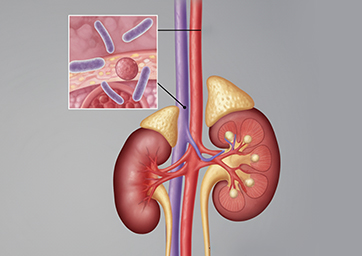AnemiaAnemia. You may
feel weak, have pale skin, and feel tired, because the kidneys can't produce
enough of the hormone (erythropoietin) needed to make new red blood cells.
Electrolyte imbalanceElectrolyte imbalance. When the kidneys can't filter out
certain chemicals, such as potassium, phosphate, and acids, you may have an
irregular heartbeat, muscle weakness, and other problems.
Uremic syndromeUremic syndrome. You may be tired, have nausea and vomiting, not
have an appetite, or not be able to sleep when substances build up in your
blood. The substances can be poisonous (toxic) if they reach high levels. This
syndrome can affect many parts of your body, including the intestines, nerves,
and heart.
Heart disease . Chronic kidney disease speeds up hardening of the arteries
(atherosclerosis) and increases the risk of stroke, heart attack, and heart
failure. Heart disease is the most common cause of death in people with kidney
failure.
Bone disease (osteodystrophy). Abnormal levels of substances, such as calcium,
phosphate, and vitamin D, can lead to bone disease.
Fluid buildup (edema). As kidney function gets worse, fluids and salt build up
in the body. Fluid buildup can lead to heart failure and pulmonary edema.



 Contact Us
Contact Us






 Hospitals
Hospitals
 Doctors
Doctors
 Diagnostic
Diagnostic
 Pharmacy
Pharmacy
 Health Tips
Health Tips
 Blog
Blog

























Comments